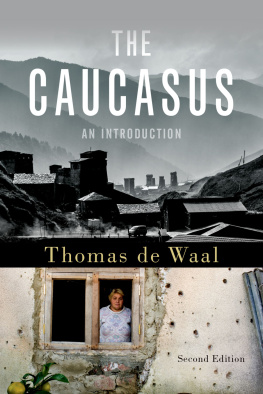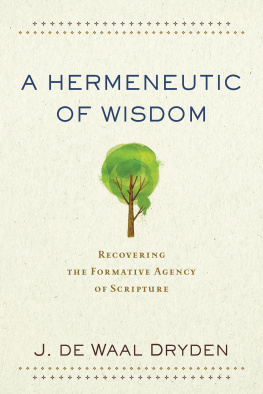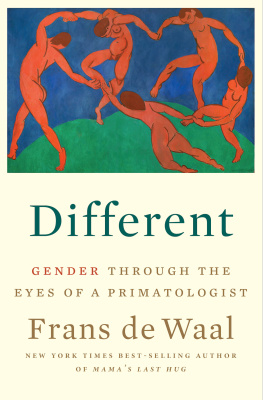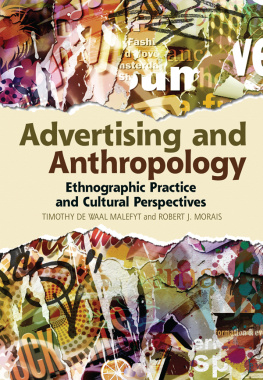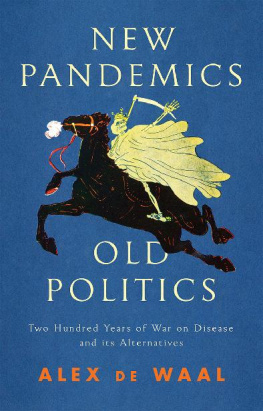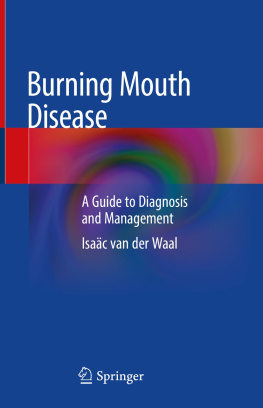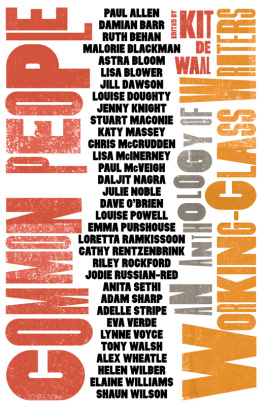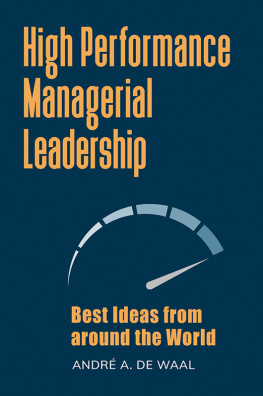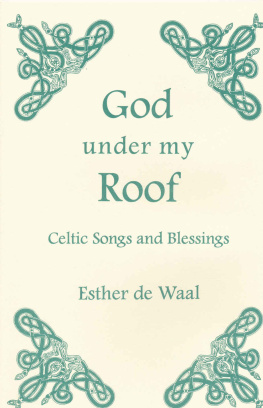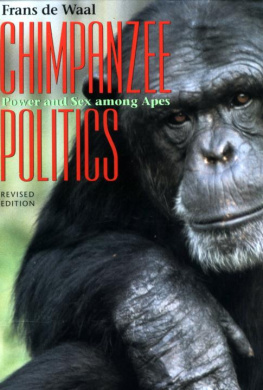de Waal Thomas - The Caucasus
Here you can read online de Waal Thomas - The Caucasus full text of the book (entire story) in english for free. Download pdf and epub, get meaning, cover and reviews about this ebook. year: 2018, publisher: Oxford University Press, Incorporated, genre: Religion. Description of the work, (preface) as well as reviews are available. Best literature library LitArk.com created for fans of good reading and offers a wide selection of genres:
Romance novel
Science fiction
Adventure
Detective
Science
History
Home and family
Prose
Art
Politics
Computer
Non-fiction
Religion
Business
Children
Humor
Choose a favorite category and find really read worthwhile books. Enjoy immersion in the world of imagination, feel the emotions of the characters or learn something new for yourself, make an fascinating discovery.
- Book:The Caucasus
- Author:
- Publisher:Oxford University Press, Incorporated
- Genre:
- Year:2018
- Rating:4 / 5
- Favourites:Add to favourites
- Your mark:
- 80
- 1
- 2
- 3
- 4
- 5
The Caucasus: summary, description and annotation
We offer to read an annotation, description, summary or preface (depends on what the author of the book "The Caucasus" wrote himself). If you haven't found the necessary information about the book — write in the comments, we will try to find it.
The Caucasus — read online for free the complete book (whole text) full work
Below is the text of the book, divided by pages. System saving the place of the last page read, allows you to conveniently read the book "The Caucasus" online for free, without having to search again every time where you left off. Put a bookmark, and you can go to the page where you finished reading at any time.
Font size:
Interval:
Bookmark:


Oxford University Press is a department of the University of Oxford. It furthers the Universitys objective of excellence in research, scholarship, and education by publishing worldwide. Oxford is a registered trade mark of Oxford University Press in the UK and certain other countries.
Published in the United States of America by Oxford University Press
198 Madison Avenue, New York, NY 10016, United States of America.
Oxford University Press 2019
All rights reserved. No part of this publication may be reproduced, stored in a retrieval system, or transmitted, in any form or by any means, without the prior permission in writing of Oxford University Press, or as expressly permitted by law, by license, or under terms agreed with the appropriate reproduction rights organization. Inquiries concerning reproduction outside the scope of the above should be sent to the Rights Department, Oxford University Press, at the address above.
You must not circulate this work in any other form
and you must impose this same condition on any acquirer.
Library of Congress Cataloging-in-Publication Data
Names: De Waal, Thomas, author.
Title: The Caucasus : an introduction / Thomas de Waal.
Description: Second edition. | New York : Oxford University Press, 2018.
Identifiers: LCCN 2018042733 | ISBN 9780190683092 (paperback) | ISBN 9780190683085 (hardcover) | ISBN 9780190683115 (epub)
Subjects: LCSH: CaucasusPolitics and government. | CaucasusHistory. | CaucasusRelationsRussia. | RussiaRelationsCaucasus. | CaucasusRelationsSoviet Union. | Soviet UnionRelationsCaucasus. | BISAC: POLITICAL SCIENCE / History & Theory. | POLITICAL SCIENCE / Public Policy / Regional Planning.
Classification: LCC DK509 .D33 2018 | DDC 947.5dc23
LC record available at https://lccn.loc.gov/2018042733
To Zoe
Such is the complexity of the South Caucasus that this small book has taken more time than it should. For generous supply of comments, expertise, corrections, and support I offer heartfelt thanks to Margarita Akhvlediani, Laurence Broers, Sopho Bukia, Jonathan Cohen, Magdalena Frichova, George Hewitt, Seda Muradian, Donald Rayfield, Laurent Ruseckas, Shahin Rzayev, Larisa Sotieva, Ronald Suny, and Maka Tsnobiladze; for photographs and more to Halid Askerov, Leli Blagonravova, (the late) Zaal Kikodze, Gia Kraveishvili, (the late) Ruben Mangasarian, and Vladimir Valishvili; for elegant and informative maps to Chris Robinson; for making the book possible to my agent David Miller and editors Dave McBride and Alexandra Dauler; for putting up with the book in their midst to my dearest wife and daughter Georgina Wilson and Zoe de Waal.
A brief word about definitions and language. I tread carefully here but will inevitably end up offending some people. I use the word Caucasian literally to describe people from the Caucasus region. The old-fashioned usage of the word, still encountered in the United States, to denote white-skinned people of European descent is the legacy of a discredited racial theory devised by the eighteenth-century German anthropologist Johann Friedrich Blumenbach. The Caucasus is a region where different nationalities have called places by different names at different times. I take a pragmatic approach of calling places by the name that was most accepted at a certain historical moment. So I write Tiflis for Georgias main city until the early twentieth century, when it was called by its Georgian version, Tbilisi; and I write Shusha and Stepanakert for the two main towns of Nagorny Karabakh. For the region as a whole, I use the term Transcaucasus when talking about it in a Russian historical context but otherwise stick to the more neutral South Caucasus. Sometimes I will risk offending people from the North Caucasuswhich is outside the scope of this bookby writing Caucasus when I mean only the area south of the mountains. The North Caucasus is a separate world, equally fascinating and complex, far more within Russias sphere of influence. The South Caucasus is complex and demanding enough for a small book.
T he countries of the South Caucasus have always been the lands in-between. In between the Black and Caspian seas, Europe and Asia, Russia and the Middle East, Christianity and Islam, and, more recently, democracy and dictatorship. Armenia, Azerbaijan, and Georgia and the territories around them have the mixed blessing of being at the crossing-place of different cultures and political systems. These fault lines have made their region a geopolitical seismic zone. The kind of local shock that might be muffled elsewhere in the world reverberates more loudly here. That was what happened in August 2008, in the tiny territory of South Ossetia, a place with barely 50,000 inhabitants: an exchange of fire between villages escalated into a war between Georgia and Russia and then into a grave crisis in relations between Moscow and the West.
The war over South Ossetia was an extreme illustration of the principle that all politics is local. The people on the ground were at fault only inasmuch as they called for help from their big outside patrons. A chain of response went from Georgian villagers to the Georgian government in Tbilisi to Georgias friends in the West; the Ossetian villagers called for help on their own government, which looked to its protector in Moscow.
For such a small regionit has a population of just fifteen million people and the area of a large American statethe South Caucasus has attracted a lot of Western interest since the end of the Soviet Union in 1991. A series of political agendas coincide here. There is a desire to resolve the three ethnoterritorial disputes over Abkhazia, Nagorny Karabakh, and South Ossetia and calm a potential area of instabilitythe crisis in South Ossetia was in fact the smallest of the three conflicts. There is continued commercial and political interest in the energy resources of the Caspian Sea, which may contain 5 percent of the worlds oil and is likely to have a role to play in Europes future gas supplies. There is support by the large Armenian diaspora in the United States, France, and other countries for the newly independent Republic of Armenia. There has been political investment in Georgias ambitions to be a model of post-Soviet reform. There is also the challenge of the South Caucasus as an arena of engagement and, more often, confrontation with Russia.
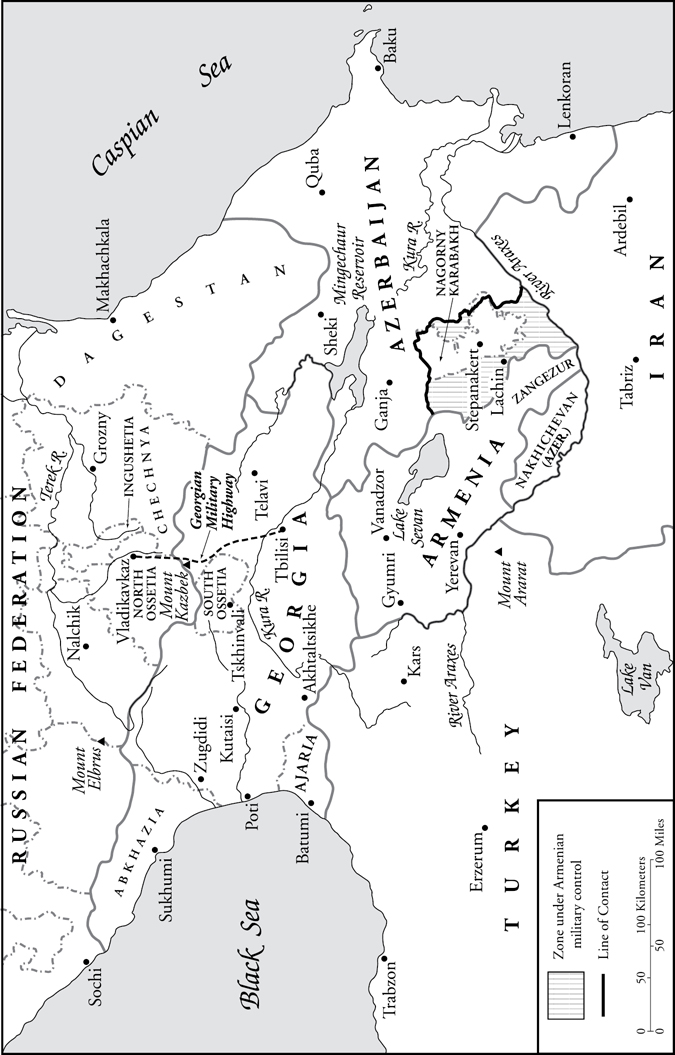
The Caucasus in 2010
The United States in particular has discovered the South Caucasus. Over the last decade, a number of very senior figures in Washington have taken an interest in the region. In May 2005, President George W. Bush stood in Freedom Square in the Georgian capital, Tbilisi, and told Georgians, Your courage is inspiring democratic reformers and sending a message across the worldfreedom will be a future of each nation and every people on earth. A year later, Senator John McCain was presented with a Georgian sword on his seventieth birthday and told Georgians, You are Americas best friends. Azerbaijan, the largest and wealthiest of the three countries of the region, drew a steady stream of high-level political and commercial visitors from the United States. In the U.S. Congress, a powerful Armenian lobby ensured that Armenia was for a while the largest per capita recipient of U.S. aid money of any country in the worldaid to Georgia would soon match that level. The danger of these kinds of interventions is that they are too narrow and focus on one part of the picture and not the whole. Yet the whole picture is deeply complex and makes the Balkans seem simple by comparison. In the past its multiple local politics have defeated the strategists of the Great Powers of the day. In 1918 British general Lionel Dunsterville tried to sum up the situation he was supposed to be sorting out:
Font size:
Interval:
Bookmark:
Similar books «The Caucasus»
Look at similar books to The Caucasus. We have selected literature similar in name and meaning in the hope of providing readers with more options to find new, interesting, not yet read works.
Discussion, reviews of the book The Caucasus and just readers' own opinions. Leave your comments, write what you think about the work, its meaning or the main characters. Specify what exactly you liked and what you didn't like, and why you think so.

